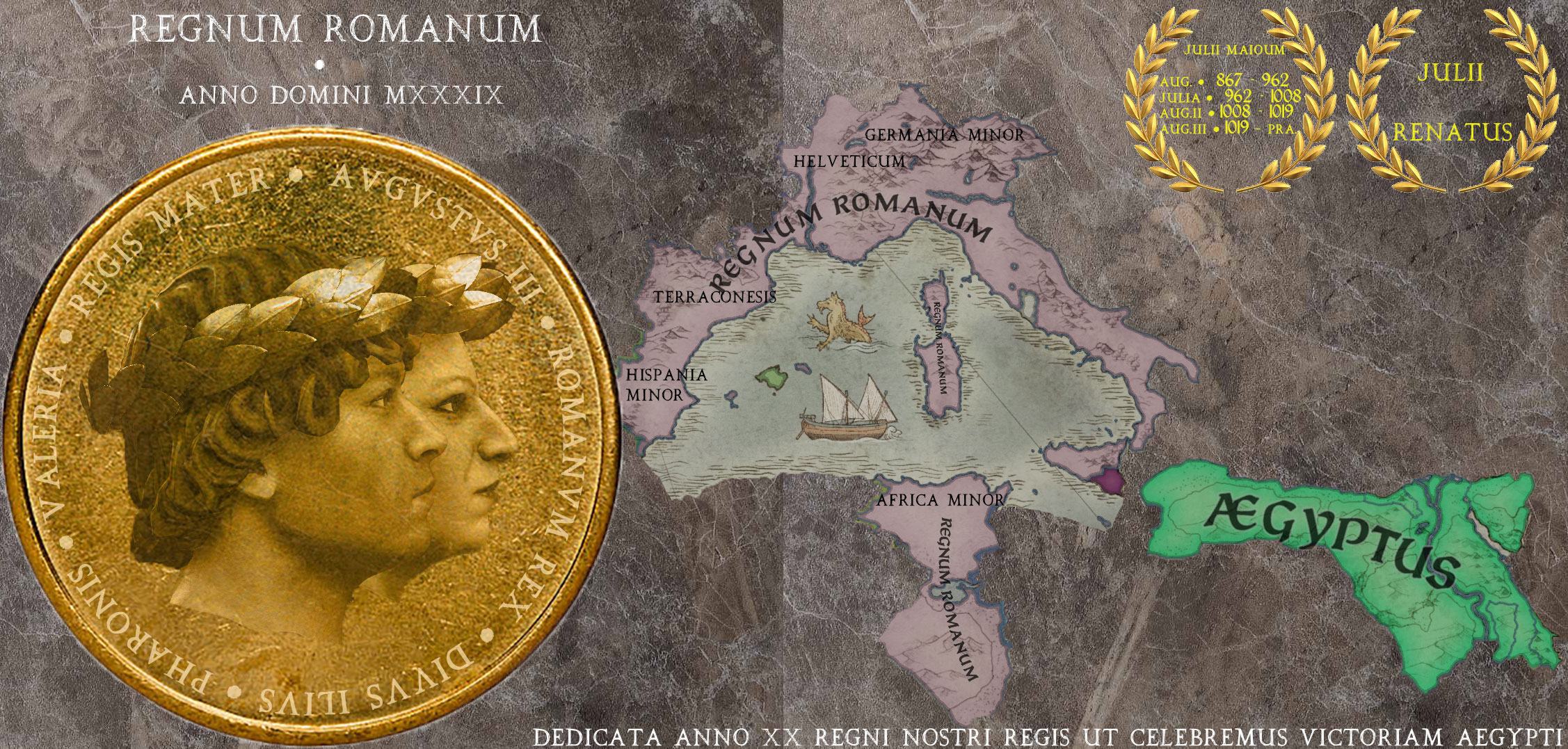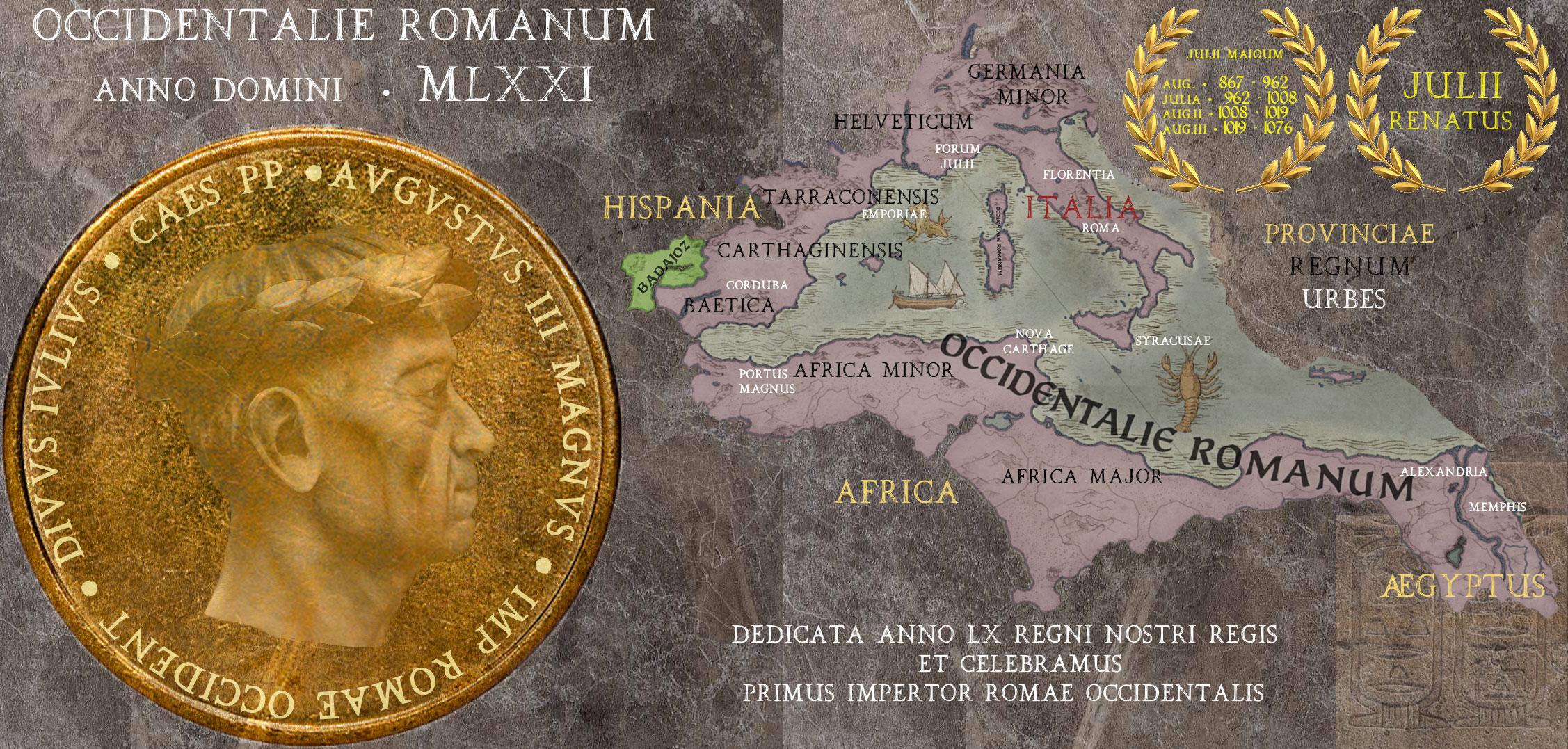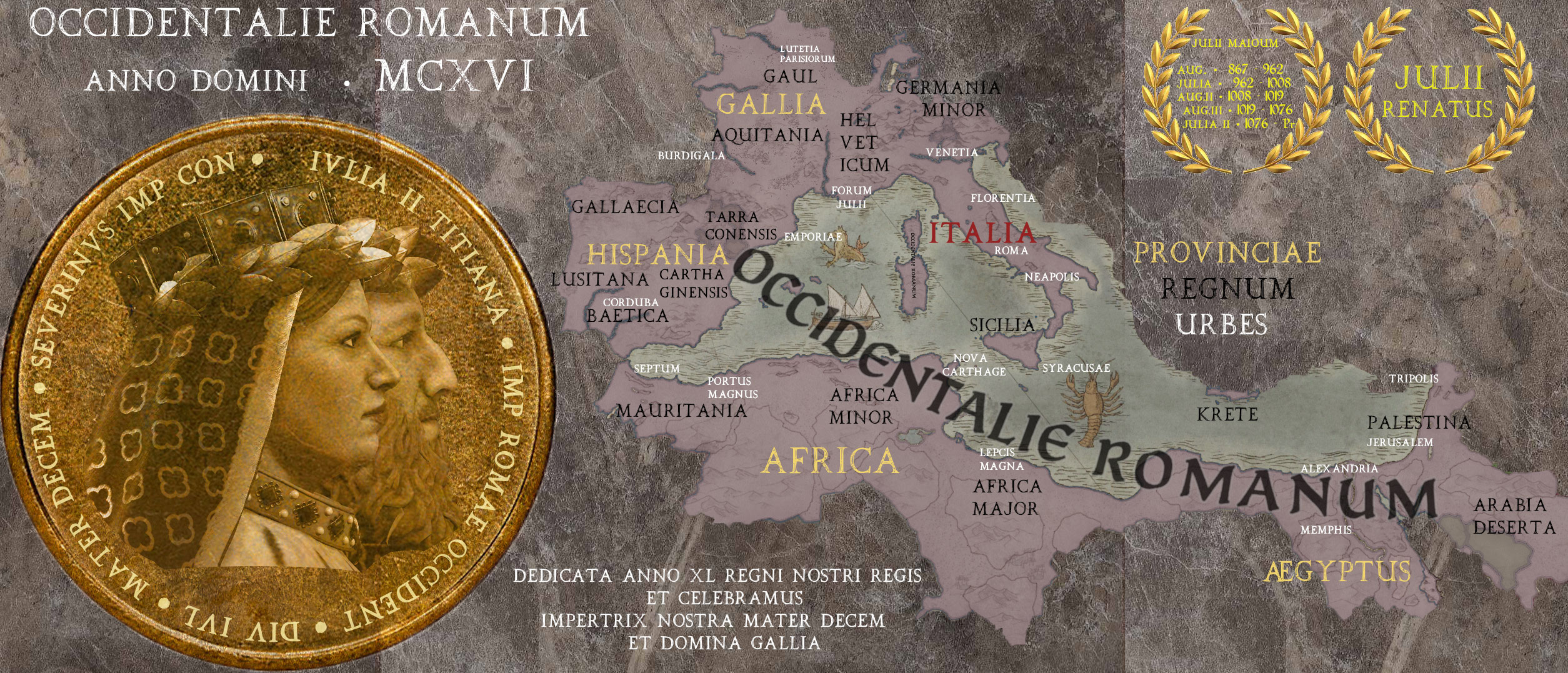REGNVM ROMANVM
In an Era when many claimed the light of Rome, an inspired nobody in the heart of Italy would take it upon himself to change the world. This is their journey from pauper to Imperator Romanum shown through a series of maps and coinage displaying the ever changing borders of the many phases of Rome.

AVGVSTVS REX: 867 - 962
Augustus, King of the Romans, Divus Julius, Thomasina, Queen of the Romans.
Italy in 867 seemed poised to play out the same Karling misadventure when in the county of Orbetello a young man of only sixteen emerged to challenge the local Count. He had built a following of what he called Verum Romani, 'True Romans'; those who adhered to the old language not only as an expression of faith but identity. Once again they took up the styles, as best they could and decorated their homes with the old ways. Augustus as he was called by his followers lived an extraordinarily long life, some would say divinely blessed succumbing to the Styx at one hundred and eleven years old. He proclaimed himself a Julii Renatus, the gens Julii would be reborn through him, all but declaring himself the heir to Caesar as shown on his coinage as, DIVVS IVLIVS.
Over his lifetime he spread the light of Rome to all of Italia, Sicilia and even to the shores of Africa all but driving out the false Greek pretender and the Karling interlopers. An uneasy stand off began between Augustus and the Pope, one which to the current reign remains unresolved, an unspoken acknowledgement that one day it will come to a head. A man with such a lengthy reign and vast conquests should surely boast a hearty lineage and yet he only had three children due to his marriage at the almost unfathomable age of seventy after a lifetime of speculation about who could possibly succeed him.
Julius, the youngest child and son of Augustus Rex would go on to take up the Duchy of Spoletto, his cadet branch the Renatus-Spoletti being known as the bulwark of the heartlands. He was never a real candidate for succession lacking the ability to handle an rapid culture shift and the issues that provokes. It was the eldest child Julia and her other brother Augustus who would be deemed the competitors for the legacy of Rome. The Gods of Old and New it seemed favoured Julia as Princeps Augustus was slain in battle on the African coast at only twenty-two years old. From his death it was clear Julia would lead the dynasty after her father's almost bafflingly suspenseful death. All men must die however and Augustus Rex left his young family to reign over it all.

JVLIA REGINA: 962 - 1008
Julia, by the Grace of God, Queen of the Romans, Divus Julius, Daughter of God.
When Principissa Julia was proclaimed Romanum Regina she was twenty-seven years old and a master of financial and civil administration having served as her father's councillor for many years. Already married to Gausberto, a Cisalpine noble she did not share her father's qualms about lineage and already had four children before ascending the throne with three more born afterwards. The most significant of these were the eldest son Princeps Justin, the eldest daughter Principissa Praeiecta and the second son, Princeps Augustus. The others predeceased their mother and left no lasting descendants who were not intermarried back into the Royal line.
Julia was unlike her father, incredibly pious. So much so that she proclaimed a guarantee that the Papacy would retain control over the old Imperial capital for as long as the rest of the Empire lay in barbarian hands. While not a clad iron and infinite respite from invasion, the Pope's opinion of the Regnum Regis have improved reign upon reign as the prospect of these upstart wannabes ever restoring Rome is a fantasy, or so he thinks. She also whole heartedly supported the Crusade for Egypt called by the Pope in 976 mostly as an attempt to satisfy her eldest and now clearly inept son with a title that was not hers. Much to his credit he took to the field with his men, though his ineptitude meant he couldn't even die valiantly and returned from the Crusade with one arm and one eye gone. Now totally unfit to rule either Rome or Egypt Julia disinherited Justin and sent him to the new conquest in Savoy, far from sight. In his place was put Praeiecta, now Ægypti Regina and quickly made it known that she would not be ruled by her mother, much to Julia's chagrin.
Julia reigned until 1008, the coin cast for her celebrates her piety highlighting as was normal for other European monarchs, but lacking with Augustus, Dei Gratia, by the grace of God. When commissioned the Rex-Consort Gausberto had passed some years before, and so in absence of his title the victory in Burgundy was celebrated when Julia was also hailed as HELVETICVM REGINA. Just before her death she secured a foothold on her wayward Egyptian daughter by marrying Princeps Augustus, soon to be Rex, to Praeiecta's daughter Valeria Gemina. She recognised that one day her line would have to take Egypt by force. Julia died of cancer aged seventy-two.

AVGVSTVS II REX: 1008 - 1019
Augustus II, King of the Romans, Divus Julius, Valeria, Princess of Egypt.
At forty-seven years old, Augustus II was the best of a bad situation. Julia had admired her daughter's moxy when it came to Egypt but was shown she could not be trusted with the Regnum Romanum. With Justin disfigured and disinherited it fell to Augustus to take up the mantle. He was by no means inept with a fine mind, calm temperament and a generous nature. His vice however was his forgiving nature which even his pious mother had come to terms with. His inability to effectively punish those who rose against him gave rise to further revolts and religious sects ran rampant as he feared the consequences of coming down upon them. This would come to a head in the great Holy war for Valencia, now Hispania Minor where putting to death rightfully those who defected caused the Rex to have a breakdown of sanity.
Like his mother he had many children; four daughters and three sons. His daughters all took to life within pious circles, akin to their grandmother with two actually taking the vows and leading lives as sisters of the church. Of his sons and possible successors, one had died early in his life and one would bleed profusely from the most minor wounds. Like Augustus II himself, he was left with the best of a bad situation, his namesake and seemingly fate's choice, Princeps Augustus. Being a much older man than his mother was at ascension, the Rex knew he had to secure the dynasty first and foremost. The other person who knew this better than anyone, was his wife, Principissa of Ægyptus, Valeria Gemina.
Valeria was a twin, her sister Julia Gemina was thanks to what looked like 'suspicious accidents' the heiress presumptive to their elderly mother's throne in Alexandria. Should her sister not have issue, the crown would fall to Valeria herself and then onto her own children therefore uniting Rome and Egypt as it was in the glory days of the Empire. Valeria was a genius, not only in trait but in action and seemingly offed many rivals of her children. When her mother died she actually inherited great estates in Southern Egypt and used her influence to undermine her sister and now Queen of Egypt.
With all this scheming going on Augustus II couldn't bear it, the sheer weight of his conscience became too much and in a unique instance of cowardice abdicated his throne in 1019 in favour of his son Augustus. Its debated whether or not Valeria actually attempted to stop her husband, or if she saw the tide turning. What is clear is that she had overwhelming influence on her husband and through coinage reminded all of her own dynastic rights as Principissa Ægypti. By 1020 Augustus II, or Augustus Emeritus as he was afterwards known, was dead from the stress he had run from, or so they say.

AVGVTVS III REX, PHARONIS: 1019 - 1039
Augustus III, King of the Romans, Divus Julius, Pharaoh, Valeria, Mother of the King.
1019 - 1039:
Like the dawn of the dynasty a boy named Augustus, only twenty-one was the shining light that all were looking to for leadership and guidance. Not only was Augutus III the grandson of Julia Regina, but through rather uncomfortable closeness of familial love, also the grandson of Praeiecta Regina, Queen of Egypt. His mother's influence over his father transferred entirely to him and Valeria Gemina stage managed her son's earliest years, most notably proclaiming that her sister's right to rule was invalid due to her sex. A ridiculous notion in an era that could still well within living memory recall Julia Regina but a casus belli nonetheless.
Augustus III cut his teeth in the alps and down into the forests of Germania, codifying her into a new pseudo province and stating intentions to the rest of the fragmenting Karling rump states. It was at thirty seven he would make his greatest contribution to the Empire when his aunt and in his mind usurper became ill and rumours of a rift between she and her heir became known. Augustus took his opportunity and led twenty-thousand men across the Delta and into Cairo and Alexandria before the Egyptians could muster any real resistance. Augutus was not proclaimed only Ægypti Rex, but Pharonis, Pharaoh. He had coins minted to celebrate this great victory and in a nod to his father's nature, he did not execute his aunt and allowed her to retain control of Alexandria as a vassal. The coins do not bare Regina Titania, the actual Queen of the Romans but Augustus' mother Valeria through whom Egypt has been given. She remains one of the most active forces in the Empire and some would say the power behind the throne.

AVGVTVS III MAGNVS, IMPERATOR ROMAE OCCIDENTALIS: 1040 - 1076
Augustus III the Great, Emperor of Western Rome, Divus Julius, Caesar, Father of his People
1040 - 1055
With Egypt brought to heel and the dynasty understanding the peril of crossing the Rex, Augustus III began to conquer along the frontiers indiscriminately. As his mother Valeria Gemina began to weaken, her influence began to shrink away. The hesitancy of careful diplomacy was replaced with wholesale bloodshed on the barbarian and heathens alike. Augustus swept through Hispania restoring Carthegensis and Baetica from 1042-1046 and without pause then led a great Crusade for the Kingdom of Badajoz in 1047. Placing his youngest son Titus on the throne of what would become Lusitana it was assumed like Ægyptus before it one day it would enter the Empire proper. The dust had not settled in Iberia when Augustus led his armies across North Africa decimating the remaining adherents of Muhammed and reforming the province of Africa to her former glory.
As Augustus arrived in Egypt for a Triumph celebrating his march from Rome to Alexandria and all the conquests which came as a result he proclaimed himself Imperator Romæ Occidentis, Emperor of Western Rome. Despite his mother dying in the same year, 1050, her diplomatic mind had not been entirely forgotten by her now Imperial son. In claiming to be the successor of Western Rome Augustus gave the Eastern Roman Emperor Dionysios a chance to acknowledge him as his equal. A deviant, sadistic drunkard, the Byzantine usurper rejected the supremacy of the Julii in the West and so Augustus proclaimed that West would reunite with East.
1055 - 1076:
If fate was kinder it would have given Augustus a longer life to see through his threats to the East but his health began to decline in the late 1050s and he looked inwards towards the succession. Only five children had come from his Imperatrix Titiana; Augustus, Nero, Martina, Quintus and Titus. With Titus already ruling in Lusitana he was deemed ineligible to succeed to the new Imperial throne. Caesar Augustus while once seen as the natural heir as the eldest son had proven himself an inept administrator and was given Africa Minor to placate him. Nero died after suffering serious injuries in the Crusade which gave his brother a Rex's crown after nearly a decade of agonised invalidity.
This left two candidates; Caesarissa Martina and Caesar Quintus. The fates are if anything, good for a laugh and it would be a choice between a Giant, Martina and a Dwarf, Quintus. The idea of either ruling over the Empire was not just laughable, it was actively dangerous for the dignity of the dynasty and the fragile centralisation process. At first preference was given to Martina in hopes her children would be more worthy but they were monstrously inbred, a sure sign of her divine rejection.
With Martina out of the candidacy pool it fell to the shortest Julii, Quintus the Quarterman as he was jeeringly called by the plebs as his litter passed in the street. Augustus had no intention of leaving his crown to his cursed son, though he had no personal ill will towards him, rather he would use him to save both the dynasty and secure the wider Empire. The King of Jerusalem was a rare thing in 1059, an Italian. After the Roman culture had re-emerged and dominated Italia the 'new' now old ways had created a diaspora in the holy land. Remarkably the King had no qualms in marrying one of his daughters, Clara, to Quintus and the two set up a court in Memphis.
Within a year Clara had given birth to a daughter, named Julia Titiana in honour of her two grandmothers and beloved by Augustus who was told by his soothsayer that good omens foretold of the girl's destiny. Yet the soothsayer said that she was unique, that none more would follow. Later in the evening Princess Clara of Jersualem died; if one prophecy was true, surely the other must be too. As if she had been the only child he had ever had an eye for, Augustus personally raised Julia and had her now widowed father Quintus sent to a Monastery.
As if living only to pass on the torch of Rome, Augutus Magnus, Imperator Romæ Occidentis, Pharonis, Dominus Hispaniæ et Africa died on 12th December, 1076 only a month before his granddaughter and heir's 18th year. As had happened at the start of his reign, Rome was now guided not only by a fiercely intelligent young woman with the blood of Caesar in her veins but also a daughter of the Holy lands with a childless uncle and a barren wife. Augustus' legacy of conquest will continue ad inifinitum until Rome is restored.
IMPERATOR MORTVVS EST, VIVAT IMPERATRIX JVLIA TITIANA

JVLIA II TITIANA, IMPERATRIX ROMAE OCCIDENTALIS, MATER DECEM: 1076 - 1123
Julia II Titiana, Empress of Western Rome, Mother to Ten, Severinus Emperor-Consort.
Coronated in Roma by the Holy Father, now a supplicant of the Imperial throne, Julia II Titiana was ready to embrace every opportunity ruling the Empire had to offer. She moved quickly to soothe the injured pride of her father Caesar Quintus and her uncles who had been displaced in her favour. It did not take long before her first conquests would remind the Empire that despite her sex, she was still the grandchild of Augustus Magnus. More importantly, she was the granddaughter of Giorgio of Jerusalem and at the time of her ascension incredibly close in the line of succession. As Princess Clara, Julia's mother, had died in childbirth the only barrier was her mother's twin and two young children. History is unsure what the chances of all three dying within months of each other naturally would be, but its unlikely. Giorgio himself was left to live out his remaining, dwindling years with the knowledge that Jerusalem would fly the standard of Rome soon.
Domestically Julia was the epitome of a Roman mother; marrying the first non-dynastic noble since the days of Rex Augustus I she began to have children almost immediately after the marriage. Some would say far too soon. It would be revealed much later that Quinta, the eldest daughter and once thought potential heir, was in fact another man's daughter. Severinus, Julia's now husband seemed unphased by the information as Julia went on to give him nine children of his own before she was 45 years old. At the birth of her final child, Decimus Severinus, she was given the title Mater Decem by the Pope as a symbol of her motherly example. Only one child died before reaching maturity and unlike her father and his generation, they are free from the affects of close familial ties.
As Julia was leading her troops against her wayward cousin the King of Badajoz she received word that Giorgio of Jerusalem was dead and that she was being proclaimed Queen throughout the Holyland. On the same day, both Hispania and Palestina returned to the Empire in their full glory. Matching the ambitions of her father, it would seem Julia had done enough for one lifetime and yet something odd had reached her ear. The King of France had gone mad; or well, he refused to don any clothes and demanded others did so as well, on religious grounds. Having used more feeble reasons before Julia took full advantage and launched a Great Divine War for the souls of the Franks and conquered Gaul in its entirety over five years, including the remaining land within Aquitania. In a reign of less than fifty years she had almost single handedly restored Gallia and finished her father's work in Hispania. She would die it is said of heart failure on 29th July, 1123 becoming the first Sovereign of her dynasty to be outlived by a first spouse; Imperator Consorte Severinus was left to assist the new Dominus of Rome, the child who gave his mother her honorific, Decimus Severinus. Hailed as a great Omen, the tenth child and only surviving son of Julia Titiana it was accepted he would lead the Empire to glory. Little did they know Decimus would decimate the glory of Rome.
But that is a tale for another time, when the story of Rome continues.
Last edited:
- 5
- 1


